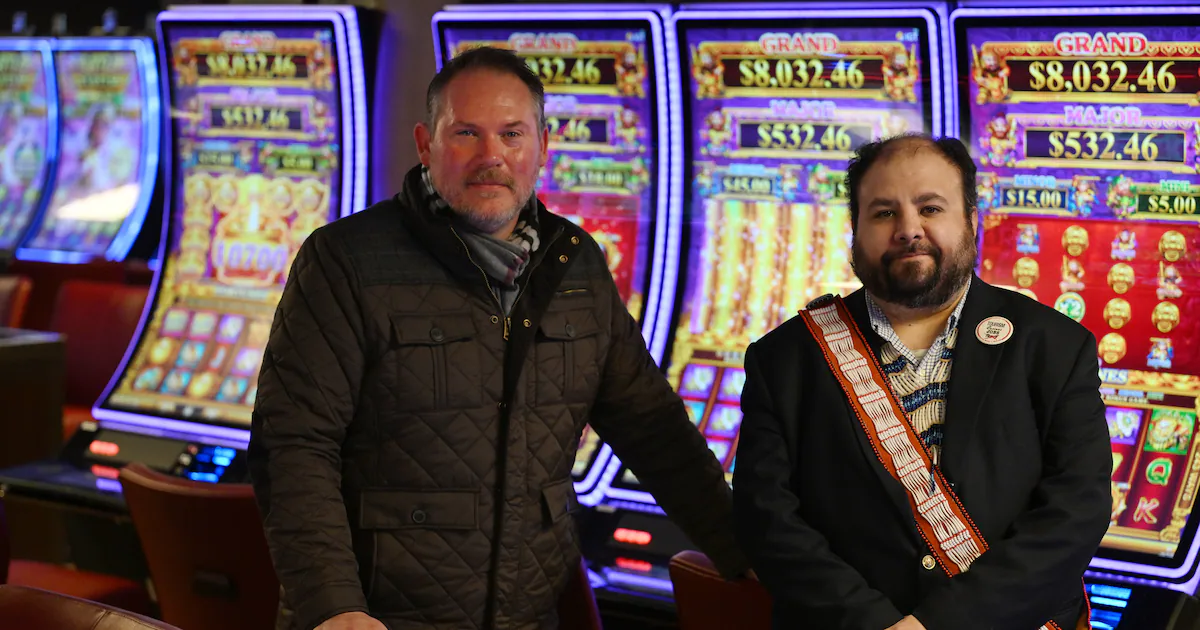
Though a temporary casino in Birchwood remains open, Native Village of Eklutna leaders have paused construction on a large, permanent gaming facility as they determine how a recent federal legal opinion could affect the project.
Village and casino leaders say they remain committed to building at least a 58,000-square-foot facility, the Chin’an Gaming Hall off Birchwood Spur Road, near Birchwood Airport. Plans call for hundreds of electronic gaming machines that resemble slot machines and at least two restaurants on an approximately 6-acre allotment leased to the village. If built, it would be the Anchorage area’s first permanent casino.
A cleared site on the northwest corner of the gaming hall property sits nearly ready for construction on the casino that village leaders say would result in better services for tribal members while boosting the local economy. Opponents, including a group of Birchwood residents who have sued to stop the project, have said the casino would disrupt life for neighbors and drive down property values.
Village representatives had hoped to open the gaming facility next year.
But a Sept. 25 Trump administration decision to revoke a 2024 U.S. Interior Department memo that expanded tribal authority over individual Alaska Native allotments has caused the tribe to postpone breaking ground, tribal and casino leaders say.
“We’ve already begun clearing the site with our hopes of starting construction on the permanent facility soon, if we can get clarity on what this new federal ruling means,” said Aaron Leggett, president of the Native Village of Eklutna.
Still, representatives said they will continue operating the temporary casino that opened in January in six stitched-together modular units while they review when — or whether — they can move forward with the next phase of development.
“We are open and expect to stay that way for generations,” Leggett said.
Eklutna officials in an email Tuesday said they were working to “assure clarity” with the federal government over questions about jurisdiction on allotments. But in interviews this week, they stopped short of specifying what legal assurances they would need before determining how to proceed. They also said they don’t know how long that decision will take.
Racing to open
For decades, Leggett said, the tribe sought to open a casino. In Alaska, casinos and similar operations are illegal, though there are exemptions for regulated wagering activities like bingo, raffles and pull-tabs.
The permanent casino, like the temporary one, would operate as a Class II facility, which states don’t have authority to prohibit on tribal lands.
After the 2024 Interior Department opinion removed a major hurdle complicating the tribe’s decades-long effort to open a casino, the village gained National Indian Gaming Commission approval for the project and opened the temporary gaming hall.
Soon afterward, Leggett said, the tribe started preparing the site of the permanent facility for construction. They stopped work late last month after the Trump administration reversed the 2024 legal opinion. The new memo also calls on the National Indian Gaming Commission to re-evaluate its approval of the tribal ordinance that authorized the Eklutna project.
In addition to the Birchwood residents’ lawsuit, which has so far unsuccessfully prevented casino construction, the state sued in February, saying the federal government had improperly stripped primary jurisdiction from the state over land owned by Alaska Native people, Alaska Native corporations and Alaska tribes, with the exception of Metlakatla Indian Community trust lands.
The state’s case hasn’t been resolved. In a statement after the Interior Department reversed its stance on Alaska allotments, the state Department of Law said it hoped the action would “resolve that litigation and provide much-needed clarity for all Alaskans.”
The U.S. 9th Circuit Court of Appeals is considering an appeal from the landowners.
Anchorage attorney Don Mitchell, who is representing the Birchwood residents, called last month’s federal memo “a positive development” and said he hoped it prompted tribal casino regulators to reverse Eklutna’s gaming approval and to close the temporary casino and “unplug its machines.”
‘We needed more space’
On a recent Friday afternoon, dozens of customers played one of the temporary casino’s slot-like machines while sports played on TVs hung on walls throughout the building. The top available jackpot at the time was nearly $56,000.
The casino had just completed paving extra parking spaces, an area still blocked off by yellow tape this week.
“It’s a budding business,” said Ryan Walker, Chin’an Gaming Hall’s general manager. “We needed more space.”
About 60% of the temporary casino’s visitors are considered regular customers because they’ve been to the casino more than three times, he said, adding that most visitors have come from Anchorage and the Mat-Su.
The temporary facility offers snacks and beverages but doesn’t serve alcohol or have a restaurant, though the permanent structure would have multiple restaurants and may sell alcohol, Eklutna and casino officials said.
The temporary casino employs about 30 people, Walker said. It doesn’t, and won’t, offer table or card games like poker or blackjack.
Leggett said the casino would benefit Eklutna tribal members — whether that’s because it provides a well-paying job, addresses a shortage of affordable housing, or allows the tribe to offer more educational assistance funding.
The tribe’s top priority, he said, is building a new community gathering center using gaming dollars. Revenue from the permanent casino would also allow the tribe to start building projects or offer new services faster, and on a larger scale, than it previously could, Leggett said.
Abandoning plans for a permanent Chin’an Gaming Hall wouldn’t force the tribe to drop development plans but would turn them into “multi-decade” endeavors, he said.
The tribe also views the permanent facility as a potential asset for the local economy that would generate about $70 million in estimated annual economic activity, Leggett said.
“So we finally see this as a way for us to not only build up our people, but to build up our community,” he said. “This is our home. This will always be our home, and we want to be part of that growth.”